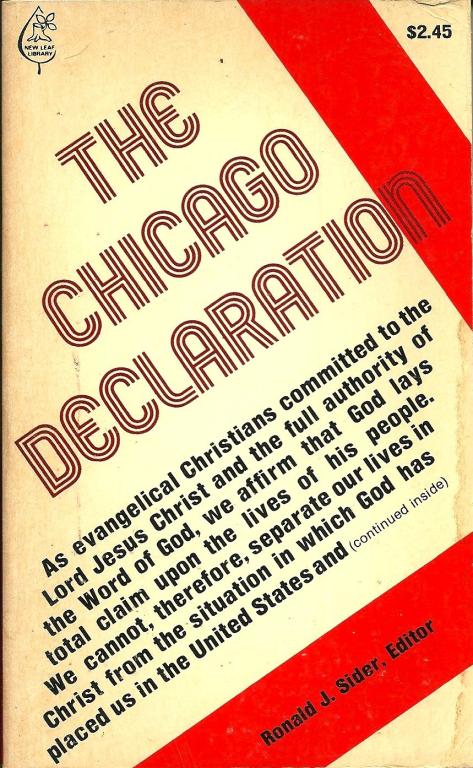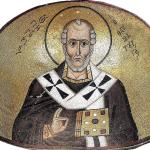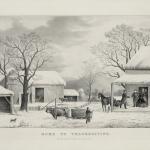 This week marks the fiftieth anniversary of the Chicago Declaration, the evangelical left’s founding document. In honor of this significant moment in American religious history, I’ve posted the full text below. But first, here are some links for context:
This week marks the fiftieth anniversary of the Chicago Declaration, the evangelical left’s founding document. In honor of this significant moment in American religious history, I’ve posted the full text below. But first, here are some links for context:
- On the lead-up to the document during the Nixon-McGovern presidential contest . . . “Ron Sider and Evangelicals for McGovern”
- On the drafting of the document . . . “Ron Sider and the Chicago Declaration”
- On the broader evangelical left movement it spawned . . Progressive Evangelicalism and the Pursuit of Social Justice and Moral Minority: The Evangelical Left in an Age of Conservatism and
- On the fragmentation of the evangelical left . . . “Ron Sider and the Fate of the Evangelical Left” (forgive the emphasis on Sider; these essays were written after his death last year; he was a key leader but hardly the only progressive evangelical involved)
- On the fortieth anniversary in 2013 . . . “Welcome to the Multicultural Church”
- On its fiftieth anniversary this week . . . “The Importance of the Chicago Declaration” and a celebration next week at Wheaton College
***
As evangelical Christians committed to the Lord Jesus Christ and the full authority of the
Word of God, we affirm that God lays total claim upon the lives of his people. We
cannot, therefore, separate our lives from the situation in which God has placed us in the
United States and the world.
We confess that we have not acknowledged the complete claim of God on our lives.
We acknowledge that God requires love. But we have not demonstrated the love of God
to those suffering social abuses.
We acknowledge that God requires justice. But we have not proclaimed or demonstrated
his justice to an unjust American society. Although the Lord calls us to defend the social
and economic rights of the poor and oppressed, we have mostly remained silent. We
deplore the historic involvement of the church in America with racism and the
conspicuous responsibility of the evangelical community for perpetuating the personal
attitudes and institutional structures that have divided the body of Christ along color
lines. Further, we have failed to condemn the exploitation of racism at home and abroad
by our economic system.
We affirm that God abounds in mercy and that he forgives all who repent and turn from
their sins. So we call our fellow evangelical Christians to demonstrate repentance in a
Christian discipleship that confronts the social and political injustice of our nation.
We must attack the materialism of our culture and the maldistribution of the nation’s
wealth and services. We recognize that as a nation we play a crucial role in the imbalance
and injustice of international trade and development. Before God and a billion hungry
neighbors, we must rethink our values regarding our present standard of living and
promote a more just acquisition and distribution of the world’s resources.
We acknowledge our Christian responsibilities of citizenship. Therefore, we must
challenge the misplaced trust of the nation in economic and military might – a proud trust
that promotes a national pathology of war and violence which victimizes our neighbors at
home and abroad. We must resist the temptation to make the nation and its institutions
objects of near-religious loyalty.
We acknowledge that we have encouraged men to prideful domination and women to
irresponsible passivity. So we call both men and women to mutual submission and active
discipleship.
We proclaim no new gospel, but the Gospel of our Lord Jesus Christ who, through the
power of the Holy Spirit, frees people from sin so that they might praise God through
works of righteousness.
By this declaration, we endorse no political ideology or party, but call our nation’s
leaders and people to that righteousness which exalts a nation.
We make this declaration in the biblical hope that Christ is coming to consummate the
Kingdom and we accept his claim on our total discipleship until he comes.
November 25, 1973, Chicago, Illinois

Signatories
John F. Alexander
Ruth L. Bentley
James C. Cross
Donald Dayton
Roger Dewey
Daniel Ebersole
Samuel Escobar
Warren C. Falcon
Sharon Gallagher
Theodore E. Gannon
Nancy Hardesty
Clarence Hilliard
Walden Howard
Robert Tad Lehe
William Leslie
C. T. McIntire
Wes Michaelson
David Nelson
F. Burton Nelson
William Pannell
William Petersen
Richard Pierard
Wyn Wright Potter
Ron Potter
Paul Rees
Boyd Reese
Joe Roos
James Robert Ross
Eunice Schatz
Donna Simmons
Foy Valentine
Marlin Van Elderen
Merold Westphal
















